

The hard problem of consciousness is a distraction from the real one. What is the best way to understand consciousness?
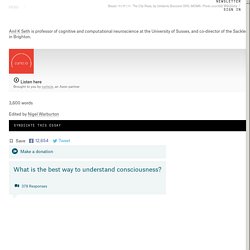
In philosophy, centuries-old debates continue to rage over whether the Universe is divided, following René Descartes, into ‘mind stuff’ and ‘matter stuff’. But the rise of modern neuroscience has seen a more pragmatic approach gain ground: an approach that is guided by philosophy but doesn’t rely on philosophical research to provide the answers. Its key is to recognise that explaining why consciousness exists at all is not necessary in order to make progress in revealing its material basis – to start building explanatory bridges from the subjective and phenomenal to the objective and measurable.
In my work at the Sackler Centre for Consciousness Science at the University of Sussex in Brighton, I collaborate with cognitive scientists, neuroscientists, psychiatrists, brain imagers, virtual reality wizards and mathematicians – and philosophers too – trying to do just this. Plato’s Allegory of the Cave - Alex Gendler. Want to read the Allegory of the Cave in its complete format?

Go to this site and get started. To better understand the allegory’s larger context, try reading the rest of The Republic by Plato and these classic lectures. Then, check out this modern scientific interpretation of what it tells us about human knowledge. Want to see two different visual representations of this allegory? Pareidolia: Why we see faces in hills, the Moon and toasties. People have long seen faces in the Moon, in oddly-shaped vegetables and even burnt toast, but a Berlin-based group is scouring the planet via satellite imagery for human-like features.
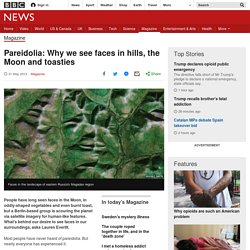
What's behind our desire to see faces in our surroundings, asks Lauren Everitt. Most people have never heard of pareidolia. Perception. Since the rise of experimental psychology in the 19th Century, psychology's understanding of perception has progressed by combining a variety of techniques.[3] Psychophysics quantitatively describes the relationships between the physical qualities of the sensory input and perception.[5] Sensory neuroscience studies the brain mechanisms underlying perception.
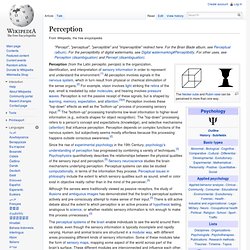
Perceptual systems can also be studied computationally, in terms of the information they process. Perceptual issues in philosophy include the extent to which sensory qualities such as sound, smell or color exist in objective reality rather than in the mind of the perceiver.[3] The perceptual systems of the brain enable individuals to see the world around them as stable, even though the sensory information is typically incomplete and rapidly varying. TOKTalk.net Sense Perception. Written on November 13th, 2012 by Oliver Kim Comments: 0 Do we hear what is really there or what we “want” to hear?

The McGurk Effect is an example of an auditory illusion. Tags: Sense Perception, Ways of Knowing. Theory of Knowledge » Theories of Perception. On a straightforward view, we directly perceive the world as it is.
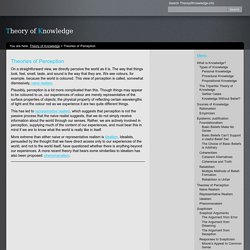
The way that things look, feel, smell, taste, and sound is the way that they are. Men and Women Really Do See Things Differently. How Colors Smell - Julie Beck. When someone asks me what flavor slushie I want, I don’t say “cherry,” I say “red.”

That flavor is called “red.” “Blue” is another flavor a slushie might have. Similarly, a cherry smell—especially the chemically cherry smell of a red slushie—is a red smell. That one’s easy, since cherries are red. It doesn’t take a wild leap to make that association. A new study published in PLOS One finds that some people say white, some say yellow, some say blue. This isn’t a study about synesthesia—the neurological phenomenon that causes some people to mix their senses, associating colors with certain letters, or sounds, or smells. Some associations were stronger across cultures—fruity smells usually went with pinks and reds, vegetable smell was often seen as green, and a “musty” odor was typically linked with browns and oranges. The chart also shows what smells each culture finds similar.
10 Limits to Human Perception ... and How They Shape Your World. Music changes perception, research shows. Music is not only able to affect your mood -- listening to particularly happy or sad music can even change the way we perceive the world, according to researchers from the University of Groningen.
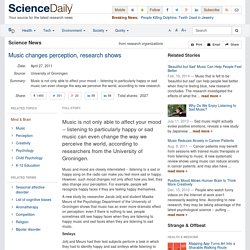
Music and mood are closely interrelated -- listening to a sad or happy song on the radio can make you feel more sad or happy. However, such mood changes not only affect how you feel, they also change your perception. For example, people will recognize happy faces if they are feeling happy themselves. Beau Lotto: Optical illusions show how we see. Try The McGurk Effect! - Horizon: Is Seeing Believing? - BBC Two. How do Optical Illusions Work.
Visual agnosia. 1 empty sense table. 1 Brief Summary of David Hume. Optical illusions bare. Sound 1tab. Sound 2sq. Sound 3fb. Sense Perception. 'Sixth Sense' Can Be Explained by Science. At least one type of "sixth sense" isn't real, new research suggests.
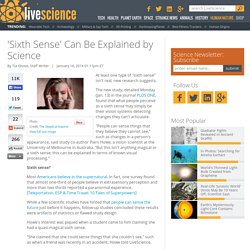
The new study, detailed Monday (Jan. 13) in the journal PLOS ONE, found that what people perceive as a sixth sense may simply be their vision systems detecting changes they can't articulate. "People can sense things that they believe they cannot see," such as changes in a person's appearance, said study co-author Piers Howe, a vision scientist at the University of Melbourne in Australia. "But this isn't anything magical or a sixth sense; this can be explained in terms of known visual processing. " Sixth sense? Most Americans believe in the supernatural. While a few scientific studies have hinted that people can sense the future just before it happens, follow-up studies concluded these results were artifacts of statistics or flawed study design.
Howe's interest was piqued when a student came to him claiming she had a quasi-magical sixth sense. Normal visual processing Die-hard believers.